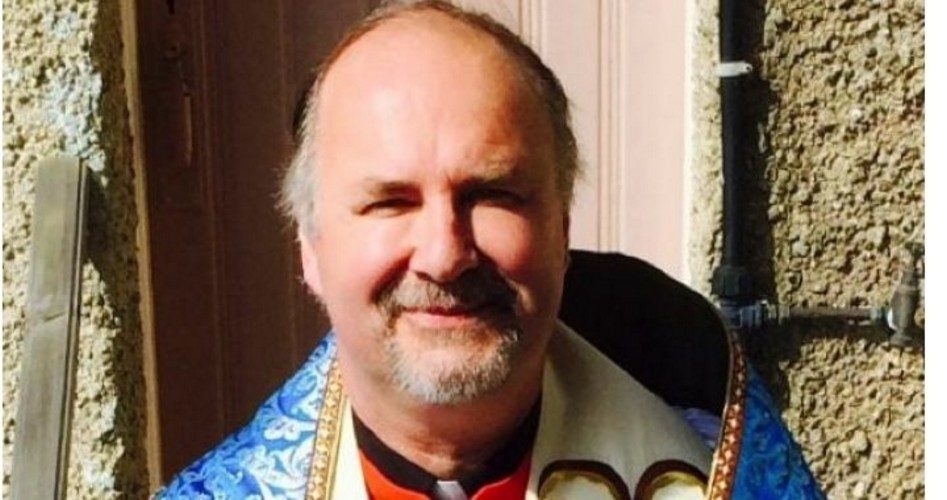
An English minister, choosing principle over prestige, has resigned his post as “Honorary Chaplain to the Queen of England” after what he called “attempts to silence or defenestrate” him because he dared defend Christianity and condemn Islam. The Reverend Dr. Gavin Ashenden (shown) of the Church of England announced his resignation as a queen’s chaplain, an honorary position currently held by over 30 individuals, on his website Saturday.
The immediate cause of Ashenden’s resignation after nine years as a queen’s chaplain was the fallout from his recent public statements strongly criticizing the decision to allow a Muslim student to read a passage from the Koran during the Epiphany service at St. Mary’s Cathedral in Glasgow. In a misguided attempt at interfaith dialogue, the church provost actually turned over a portion of a service commemorating the Magi’s visit to the Christ child — the son of God, according to the New Testament — to the reading of the holy book of another faith.
“Then,” Ashenden wrote in a column for the Jersey Evening Post, “just to add the glowing cherry of offence to the iced cake of incompetence, he chose a famous passage in the Koran that repudiates the divinity of Christ. It’s the passage Muslims use when they want to convince Christians that the Gospels are full of lies about Jesus — that they were deceived about him being the Word made flesh, or that he actually rose from the dead.”
That passage, Surah 19, declares, “Allah can have no son.” It “states that Mary was ‘ashamed’ after she gave birth, and that the infant Jesus miraculously spoke to her from his crib and claimed he was ‘a servant of God,’” according to Christian Today, which notes that Muslims believe that Jesus was a prophet and precursor of Mohammed but not the son of God.
In his column, Ashenden said that he is “very much in favor of people reading the Koran” so they can see for themselves both its “beautiful and moving passages” and its “blood curdling ones about punishing and killing people who misbehave.” “But,” he continued, “there is a time and a place,” and a Christian church service is neither the time nor the place for it.
Moreover, as an exercise in interfaith dialogue, it was a resounding flop. As Ashenden pointed out in another piece, “In over 30 years of interfaith conversations, I have never yet come across a Muslim community which allowed those passages in the Gospels acclaiming the divinity of Christ to be read in Friday prayers.”
In addition, in a letter to the London Times, Ashenden wrote:
Quite apart from the wide distress (some would say blasphemy) caused by denigrating Jesus in Christian worship, apologies may be due to the Christians suffering dreadful persecution at the hands of Muslims in the Middle East and elsewhere. To have the core of a faith for which they have suffered deeply treated so casually by senior western clergy such as the Provost of Glasgow is unlikely to have a positive outcome. There are other and considerably better ways to build “bridges of understanding.”
The provost, Kelvin Holdsworth, in typical liberal fashion, chose not to engage Ashenden’s and other critics’ biblically and historically grounded arguments but to engage in victimology, wondering aloud whether such criticism was based in homophobia and sexism. Holdsworth is openly gay, and the student who read from the Koran is female.
Ashenden has long been critical of Islam. According to the Daily Mail, in 2015, he told LBC Radio that the Koran contains “over 100 verses inviting people to violence,” such as ones instructing Muslims to “strike off the heads” of “those who disbelieve.” When offered the opportunity to retract his remarks because they might offend Muslims, Ashenden replied, “If they are offended by my quoting the Koran they are not offended by me, they are offended by the Koran.”
In his resignation post, Ashenden said that “over the last few years” people who disagreed with his defense of the Christian faith — he has repeatedly argued that Islam is founded on power and violence and Christianity is founded on love and forgiveness — have written to the palace in an effort to have his commission as a queen’s chaplain revoked. “When I was confronted with these attempts to silence or defenestrate me,” he explained, “my reaction was to ask ‘in what way is a priest defending the faith on behalf of a monarch who was Defender of the Faith, incongruous or improper?’”
The latest row over the reading of the Koran seems to have been the last straw for the royals. Ashenden stated that he decided to resign “after a conversation instigated by officials at Buckingham Palace.”
While obviously disappointed that it has come to this, Ashenden wrote that he now understands that “the Queen should not be drawn into public affairs where she is deemed to be taking a position,” and as long as he remained a queen’s chaplain, his public statements would naturally be assumed to reflect the queen’s sentiments. Thus, he had the choice of remaining a queen’s chaplain and keeping mum about important issues or resigning so he could speak his mind.
“Because I think it a higher and more compelling duty to speak out on behalf of the faith, than to retain a public honor which precludes me doing so at this time, I resigned my post,” he penned.
It is refreshing to see someone stand up for his principles even when it costs him. It is an unfortunate sign of the times, however, that a Christian minister was forced to resign from service to the head of the Church of England for defending the faith.


